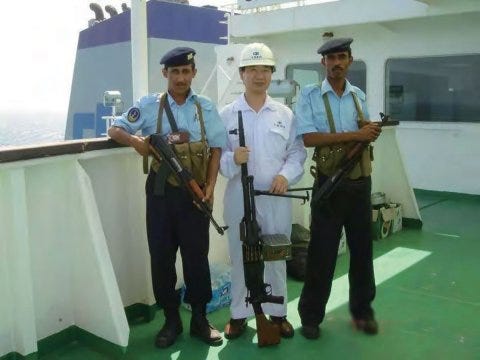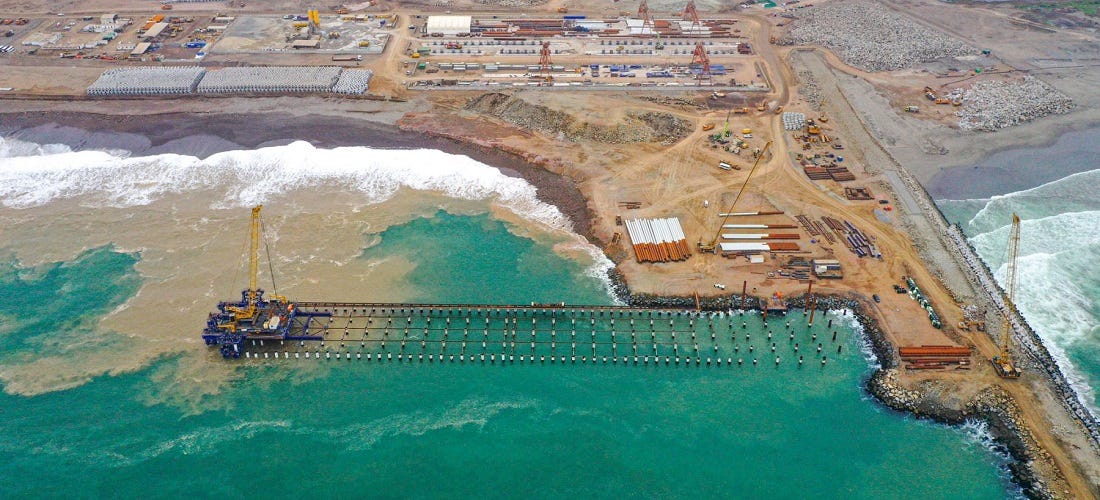The growing threat of China's maritime expansion
As China funds and operates deepwater ports around the world, some experts are calling for the US to reestablish its former maritime prowess. It's probably too late.
By the end of 2024, Peru is slated to have a new, deepwater mega-port in Chancay, a small city located about 50 miles north of the capital city of Lima. Once opened, the port should cut shipping times to and from Asia to about 10 days, down from close to 45 days currently. This will significantly speed trade and benefit customers across South America.
This new infrastructure has some in the US worried. That’s because the port, which comes with a price tag of $3.5 billion, is primarily owned by a Chinese state-owned enterprise — Cosco Shipping.
The US fears the ability to accommodate megaships directly between the Pacific coast of South America and China could alter trade patterns, allowing China to more easily access and dominate the continent’s resources while bypassing the Panama Canal and several US ports. Additionally, American officials are uneasy about China's increasing economic and military influence in the area.
“This will further make it easier for the Chinese to extract all of these resources from the region, so that should be concerning,” says Army Gen. Laura Richardson, who heads the U.S. Southern Command.
Cosco currently owns a 60% interest in the Peru project, which is funded by Chinese bank loans. Chinese state banks have a history of making large loans to build infrastructure in much of the developing world and then seizing control of the assets when the countries can no longer pay their debts. Think: Tony Soprano meets the global supply chain.
One example of this happened in December 2017. Sri Lanka gave China a controlling equity stake and a 99-year lease for its deepwater port in Hambantota. In exchange, China made a $1.12 billion investment in Sri Lanka’s foreign reserves.
When Newsweek did a deep dive into China’s stake in global maritime ports a few years ago, the magazine found 96 ports around the world where Chinese companies are known to have a stake.
Cosco even has a stake in five US ports — Miami, Houston, Long Beach, Los Angeles, and Seattle — and Chinese companies have interests in 61 port facilities in 30 African states. “Just eight African coastal or island countries do not host China-owned port infrastructure,” Newsweek reports. “Moving north and east into the Middle East, concessions dot Morocco, Egypt, Saudi Arabia, Iraq, the United Arab Emirates, Oman — even U.S. ally Israel.”

“The People’s Republic of China (PRC) has become, by far, the leading commercial maritime power in the world,” wrote Navy intelligence officer Christopher J. McMahon in a 2021 article for the Naval War College Review entitled, ‘The Middle Kingdom Returns to the Sea, While America Turns Its Back—How China Came to Dominate the Global Maritime Industry, and the Implications for the World.’
“There is a strong prospect that within little more than a decade, or even sooner, China virtually will control the world’s seagoing supply chain. The consequences of this happening for the United States and the world as a whole are staggering.”
McMahon lays out a chilling case for why the United States must immediately and decisively reestablish a foothold in the maritime industry:
Regarding port ownership and operation, whereas US companies such as SeaLand Services once operated containership ports around the world, that company, like many US-flag shipping companies, ceased to operate when it was purchased by a foreign-owned company. The ports and terminals once owned by SeaLand now are owned or operated by foreign port operators. The only US port operator with terminal operations outside the United States is SSA Marine, which operates slightly more than a dozen terminals in ports around the world, in addition to its North American terminals. However, nearly half the interests in SSA are held by foreign nationals.
When China owns and operates foreign ports, they can influence decisions over which ships are allowed to dock, when cargo can be loaded and unloaded, and where shipments ultimately go. Additionally, a huge amount of data is managed by port and logistics operators including corporate, transport, and personal information. As China exerts control over the construction of global ports, they are also building in clauses that give them easy access to intelligence. For example, when Cosco took over the busy Greek port of Piraeus, China replaced the port’s network infrastructure with all-Huawei, 5G-equipped equipment.
General Richardson has also voiced concerns about the new port in Peru being repurposed for military functions under the control of China. That’s a valid concern. Newsweek reports that Chinese navy ships have called in to more than 30 ports where Chinese companies have acquired infrastructure. China already has a naval base in the Red Sea nation of Djibouti.
So far, China’s global influence and increasing dominance of the maritime industry has gone unchallenged. Like a cancer that has metastasized, there will be very little the US hegemony can do at this point — shy, of course, of military action. And with the US basically broke — morally and otherwise — and virtually every branch of the military under- or unprepared (not forgetting understaffed), the future is looking more and more Chinese-y. You better brush up on your Mandarin, gweilo!




I don't fault the Chinese for this. They are simply filling a vacuum that the US created.
Our policies have made it such that there are very few US flagged ships. Very little commercial US shipbuilding. They have driven the shipping industry away from US ports with things like the Jones Act. Regulations written (not laws enacted) by regulatory agencies that make US development a near impossibility for any additional deep water ports. Taken patrol vessels from their roles ensuring safety of shipping to support endless wars.
This is not even considering the foreign policy of the US that makes partnership in any offshore development problematic.